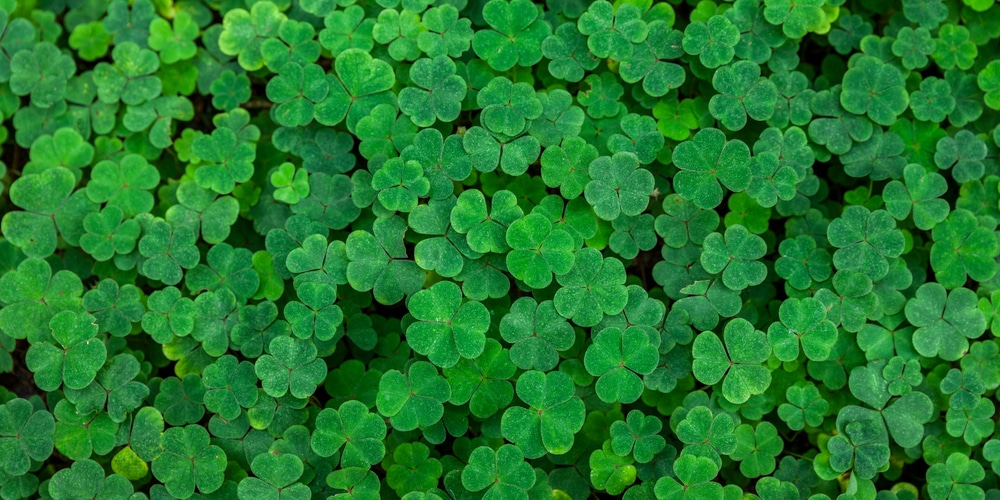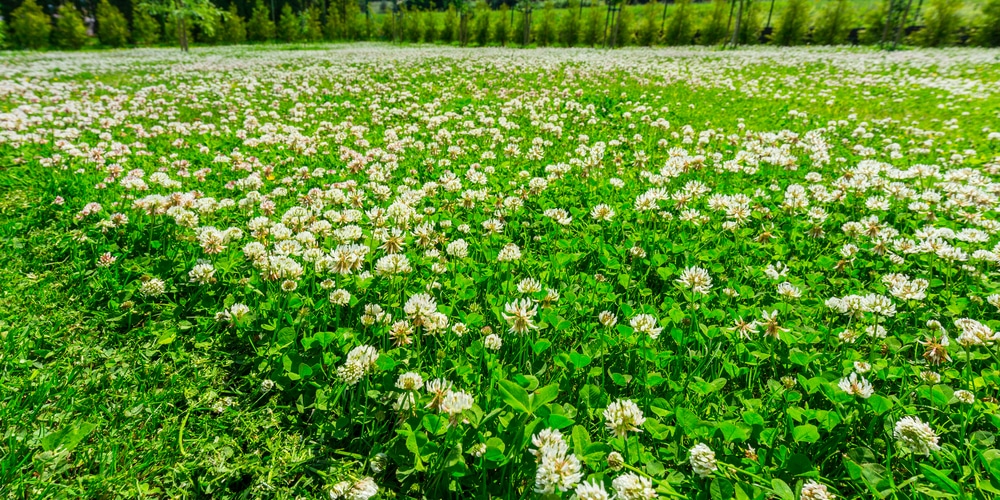Clover (Trifolium ssp.) throws natural nitrogen into the soil. So, this plant offers an invaluable way to replenish fields, lawns, and garden beds before sowing other crops. Can clover grow in shade?
Quick Answer
For its intended purpose, clover can only tolerate partial shade. It belongs to the legume family, which means it needs high light levels to thrive.
Clover is a nitrogen soil fixer. In detail, it develops small nodules of nitrogen attached to its roots. And when the plant is injured or dies, the nodal roots release nitrogen into the soil. But for root development to occur, clover needs sunlight.
Trifolium Subterraneum
Growers who want to sow clover in partially shaded areas can plant sub-clover varieties. For clarity, subterranean clover tolerates up to 50% shade.
This species looks different from other Trifolium varieties. For example, a sub-clover always has hairs on the back of its leaves. To be precise, sub-clover displays four unique features:
- Its runners are hairy.
- The flowers have a red band.
- Visible leaf markings appear on the outer edge of the leaves.
- You can see a red stipule, a tiny leaf at the intersection of the runner and flower stem.
You can find several cultivars and all of them tolerate waterlogging pretty well. What is more, different cultivars can grow together and get tangled.
Like other members of the pea family, this plant can become invasive. So, following the instructions that come with the seeds is highly recommendable. Also, contacting a county weed specialist is a good idea.
Using Shade To Control Clover
Growers looking for non-chemical control options can use shade to reduce herbage production.
Does shading your lawn kill clover? Not exactly. Using a shade cloth to lower full-sun exposure by 60% or above will reduce clover content rapidly. However, it will only slow down its growth. So, other measures will be necessary.
The deep shade will inhibit photosynthesis, which will stunt root growth. But depending on the flowering period, seed dispersal may only postpone the problem.
Generally speaking, clover grows in lands that lack nitrogen. So, applying an organic, slow-releasing nitrogen fertilizer like cow manure or bone meal can also help control clovers in your fields.
If everything fails, a selective herbicide may be your last hope. For clarity, a selective herbicide only kills the weeds you want to control without harming your turf or other flowering plants. When choosing this route, it is better to add a surfactant. That is, a wetting agent that helps the weed control product stick to the clover leaves.
Planting Clover In Shade As Deer Food
Food plots are not always the best solution to attract deer. In fact, each deer is an individual, and its nutritional demands are constantly changing. So, planting clover around your hunting location—on your trails and in pass-through areas—is a good idea.
Deer are highly selective of plant species. But they also choose specific parts of plant species to meet their nutritional demands. In other words, they mix a diet of several microminerals like sulfur and zinc.
Clover seeds do not need to undergo the cold stratification process. As a matter of fact, they are some of the easiest seeds to germinate as they grow faster than rye. And the only critical factors are soil pH and temperature.
Every Trifolium species has soil pH and temperature preferences. But you can overcome every obstacle by mixing different seed varieties before sowing them. Above all, be sure to include different cultivars of sub-clovers for the most shaded areas.
Can Clover Grow In Shade?: Final thoughts
When is the best time to sow clover in the shade? Usually, spring is the worst time to seed clovers because most weeds are already growing. But in the shade, you might find it easier to outcompete native plants growing in shaded places. Experiment sowing in early spring and mid-fall as long as the temperatures are not too high or low.
High temperatures and drought are not ideal conditions for young clover seedlings. Likewise, frost and heavy rains can suffocate an underdeveloped root system.
Moisture is also an essential factor when choosing a location. Otherwise, the clover might quickly die because of a lack of water. If moisture or humidity can be a problem, it is better to sow clover in the late summer. Why? Because you will give more time to the clover to establish.


